12–15 minutes
Women, both those from the affected communities and activists from outside the valley have been in the forefront of the Narmada Bachao Andolan (NBA). Whether in Gujarat, Maharashtra or Madhya Pradesh, women have led the struggle and have been on its frontlines. In the process they have borne the brunt of state repression: many were jailed, beaten and a few were even sexually abused for their opposition to the Sardar Sarovar Project (SSP) and the development model it represents. The interviews presented below are the voices of some key women leaders of the movement narrating their experiences of the struggle and the unique and diverse roles that women have played in the movement.
The Late Dedli (bai) Vasave
Submergence Village: Domkhedi, Maharashtra
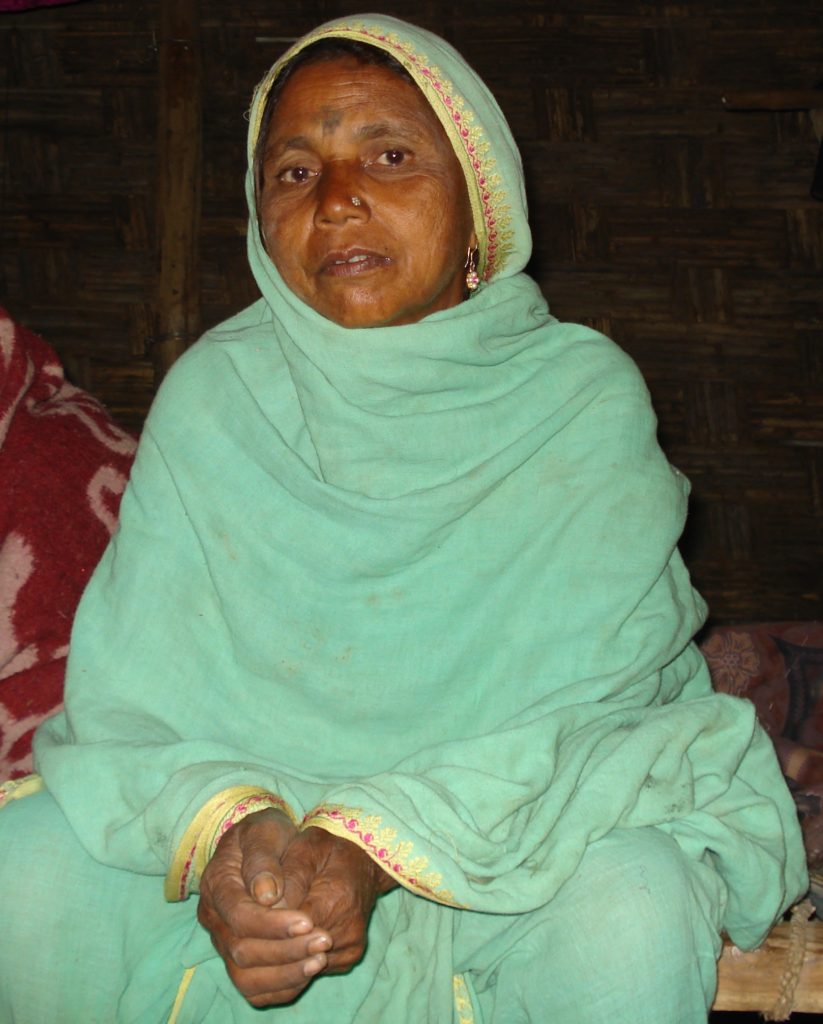
Dedlibai has been a key adivasi leader of the Narmada Bachao Andolan (NBA). Her village Domkhedi is one of the 33 villages falling in the submergence zone of the Sardar Sarovar Project (SSP) in the state of Maharashtra. Dedlibai’s contribution to the NBA has been phenomenal. She has taken up several and diverse responsibilities, ranging from grass roots mobilisation of women in the remote adivasi villages affected by the SSP, to representing the NBA before government functionaries and committees. Dedlibai’s unique interview not only describes her own role but also describes how the adivasi women of the Narmada valley, with no formal education, coming from villages untouched by electricity and untouched by roads – (until they were built by the state only to be used to displace thousands of scheduled tribe families) fought for their right to life.
Interview Duration: 0:53:00
Language: Pawari, Subtitles in English
The Late Pervi (bai)
Submergence Village Jalsindhi, Madhya Pradesh
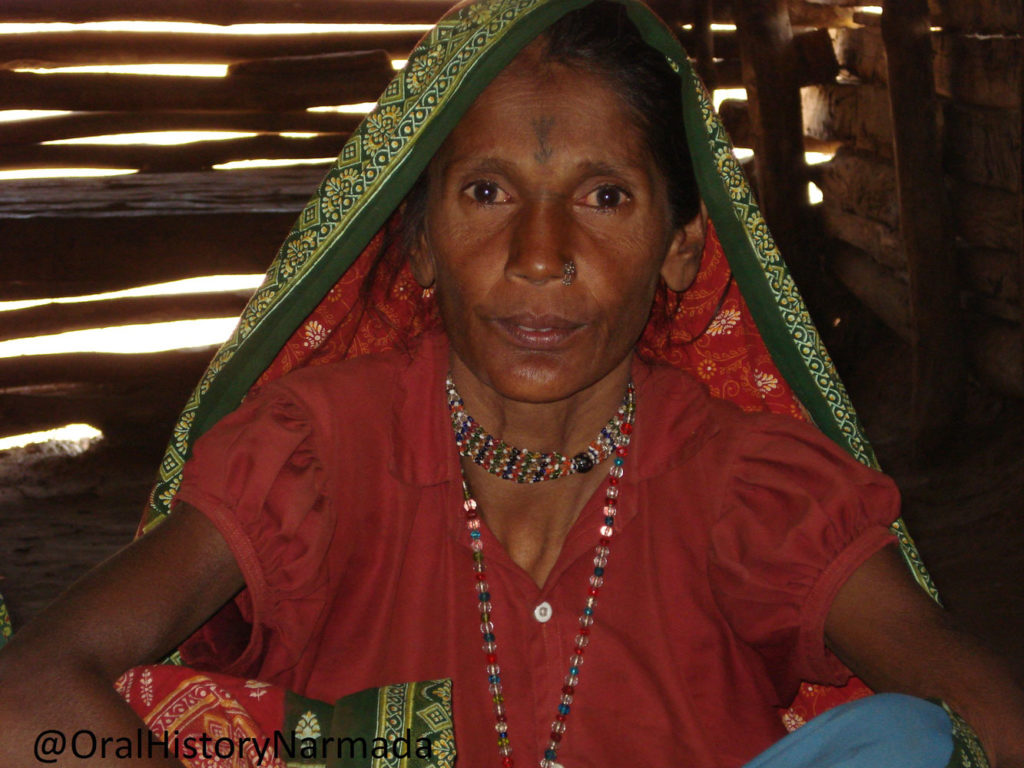
Pervi, a senior adivasi leader of Narmada Bachao Andolan (NBA) and Khedut Mazdoor Chetna Sangathan (KMCS) belonged to one of the 193 villages to be submerged by the Sardar Sarovar Project (SSP) in Madhya Pradesh(M.P.). As part of the KMCS and the NBA, Pervi participated in the struggle on multiple fronts. Initially in the 1980s, the struggle was against the forest department in M.P. for establishing the rights of the scheduled tribes over forest land and against indescribable state repression; later, the struggle was against the SSP as part of the NBA. Pervi’s interview is therefore unique because it helps us understand the many struggles of both the KMCS and the NBA and their interrelationship.
Interview Duration: 0:59:30
Language: Bhilali, Subtitles in English
Sadhana Dadhich
Pune, Maharashtra
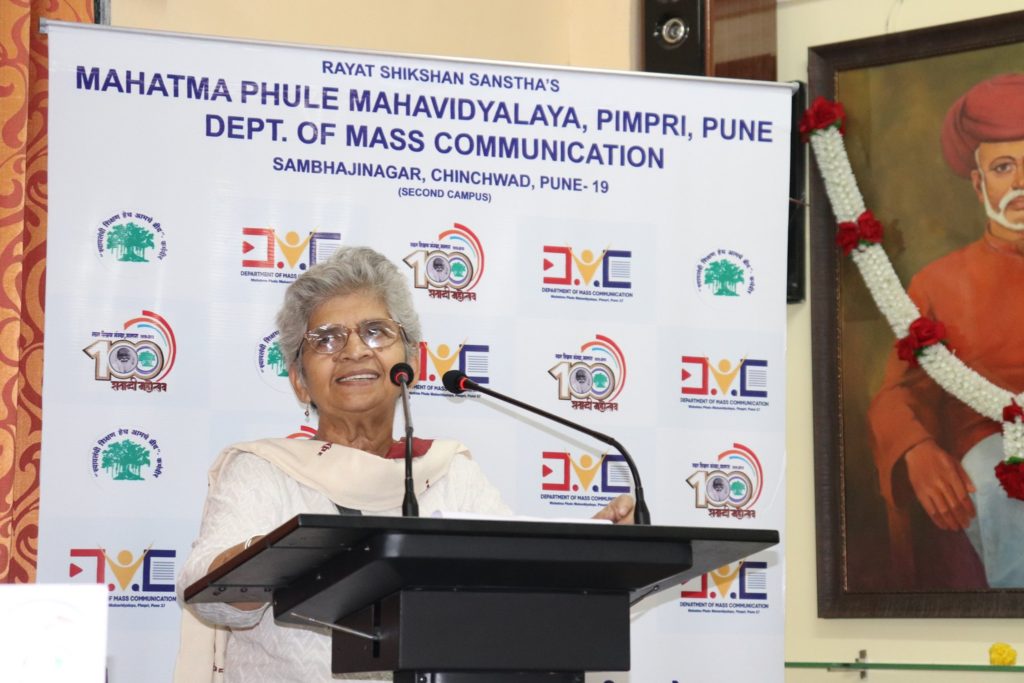
Sadhana Dadhich, has been a key member of the Narmada Bachao Andolan (NBA) from its early days. Her role in the expansion of NBA in Maharashtra is phenomenal. She has worked tirelessly year after year to strengthen the NBA. A physiotherapist by profession who has worked for and retired from the Indian Army, Sadhana, who is based in Pune, was initially active in the struggle for women’s rights and was the founding member of the Nari Samata Manch. Later on, she began focusing more on the NBA devoting substantial time in strengthening the ideological base of the movement, helping set up and strengthen the NBA support groups (Samanvay Samities) in Pune and in the rest of Maharashtra. She also spent substantial time in the Narmada valley, helping mobilise women and increase their participation in the movement.
Maharashtra state is unique as far as dams are concerned: it is home to the largest number of big dams in the country, but it is also home to one of the earliest struggles against a dam in the country, the Mulshi Satyagraha. Expanding the NBA’s base in Maharashtra was not easy because there is a strong support for large dams not only among development planners but also the powerful lobby of sugarcane farmers and some of the progressive and established people’s organisations and political parties in the state. In spite of this, Sadhana worked year after year to strengthen and extend the NBA’s base in the state and carried out extensive support activities for the NBA especially in the times of crises that it faced.
Interview Duration: 2:46:00
Language: Hindi and English, Subtitles in English
The Late Kapila (ben) Tadvi
Waghadia, Gujarat
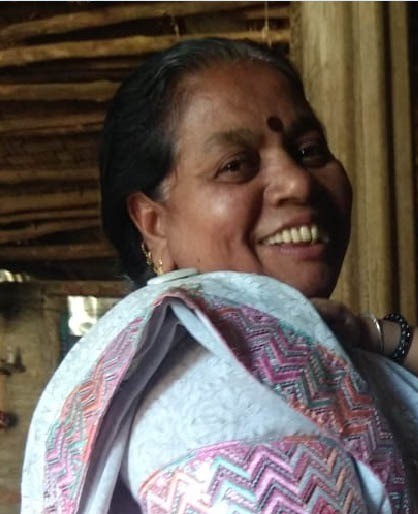
“They thrash us a lot…They beat us, especially us women because they know that women have more strength…we have been going to jail ever since the movement began”, Kapilaben Tadvi.
Kapilaben, a prominent adivasi leader of the Narmada Bachao Andolan (NBA) in Gujarat, who sadly passed away a short while before I wrote this piece on her in March 2021, came from village Waghadia, one of the six villages acquired for the Kevadia Colony, the staff colony of the Sardar Sarovar Project (SSP). Kevadia Colony, now famous for the world’s tallest statue – the statue of the veteran leader Sardar Vallabhbhai Patel named as the Statue of Unity – has been witness to the struggle of the scheduled tribe villages ever since the foundation stone of the SSP was laid in 1961. The struggle of the adivasi women of these villages in particular has been extraordinary since they had to fight against a project that is popularly believed to be Gujarat’s ‘lifeline’. Besides, she had to fight in the state of Gujarat which was exceedingly hostile to the NBA.
Kapilaben’s interview is a ‘must listen’ as it throws light on the terrible history of dispossession of a scheduled tribe community and the amazing role that adivasi women have played in this key struggle against destructive development in independent India. It is a struggle which brought an important question about development projects to the forefront: “Who Benefits? At Whose Cost?” Kapilaben led the struggle from the front and for several years, the NBA office functioned from her home. Her firsthand experience of the struggle against the SSP and what it has done to the people belonging to the scheduled tribe of Gujarat exposes for everyone the underbelly of this large-dam based ‘Gujarat Model’.
What is ironic is that while Kevadia colony is a tourism hotspot today because it boasts of world’s tallest statue and draws worldwide attention, the adivasi communities, on whose lands this popular destination in Gujarat is built, have not even been considered Project Affected Persons (PAPs) and hence, never even been rehabilitated. Instead, they continue to be dispossessed of their lands and natural resources and when they protest, they become victims of State repression. But this has not deterred the people and the struggle continues till date, over more than 60 years since the acquisition of their lands in 1961.
Interview Duration: 2:00:00
Language: Gujarati, Subtitles in English
Rukmani (Kaki) Patidar
Submergence Village: Chotabadada, Madhya Pradesh
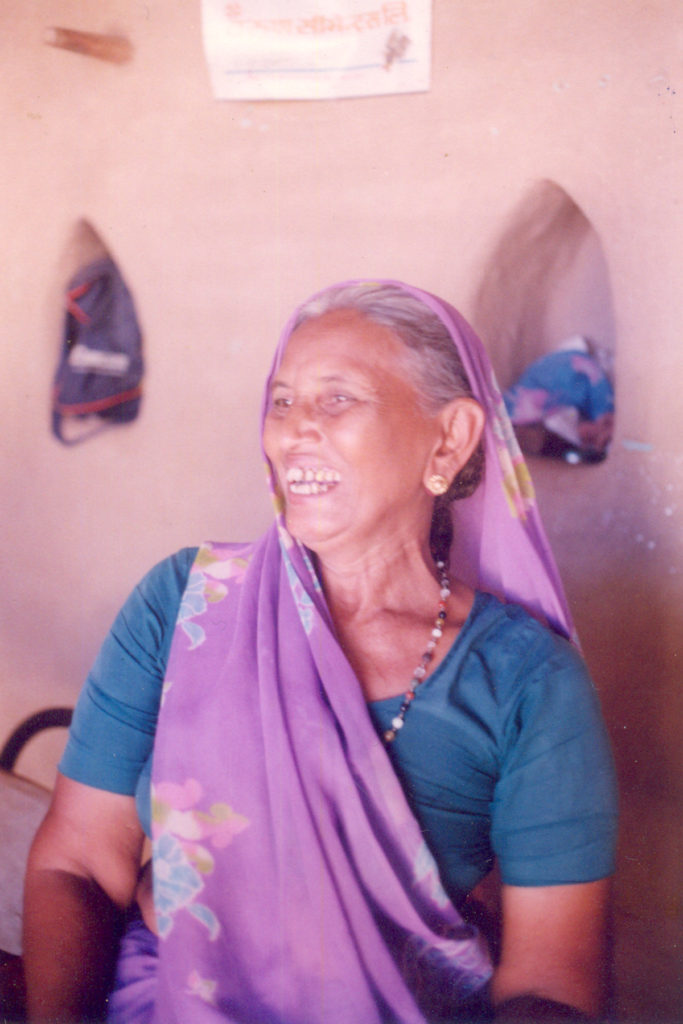
Women have been the back bone of the NBA, particularly local women who have taken up several important responsibilities in the movement including grass roots mobilisation, leading rallies and marches, conducting a dialogue with the government officials, undertaking fasts, and being part of the dedicated squads of the NBA for programs like Jalsamarpan. One of the most outstanding of them all is Rukmani Patidar, popularly known as Rukmikaki or just Kaki. An oustee herself, she was one of the first women from a submergence village, to come forward, join the movement against the Sardar Sarovar Project (SSP) and also take upon herself the task of mobilising other women across the Narmada Valley from the early phases of the movement itself. Without local women leaders like Rukmikaki, it would not have been possible to have such a large participation of women in the NBA, especially from the villages of Nimad where patriarchal norms are entrenched and where gender inequality is widely prevalent.
Rukmikaki’s interview throws light on how women in the Narmada valley were mobilised. Before this, women hardly ever stepped out of their homes to participate in political and public activities in such large numbers. She talks of her own role in helping women of the Narmada valley overcome gender discrimination. This interview in particular helps us understand the efforts that have gone into building a powerful people’s movement and how women who had rarely stepped outside of their villages were transformed into active participants in the intense struggle to protect their livelihoods against destructive development, willingly facing police batons and being jailed. Rukmikaki explains how mobilisation of people and meaningful participation of people, including women is the key to the effectiveness of any struggle and how this is also the most difficult of all tasks in a struggle.
Rukmikaki’s interview also gives us an insight into the many intricacies of the NBA, as well as her own views about the different strategies adopted by the movement including fasts and jalsamarpan.
Interview Duration: 2:20:00
Language: Hindi, Subtitles in English
Geeta Vasave
Submergence Village Nimghavan, Maharashtra
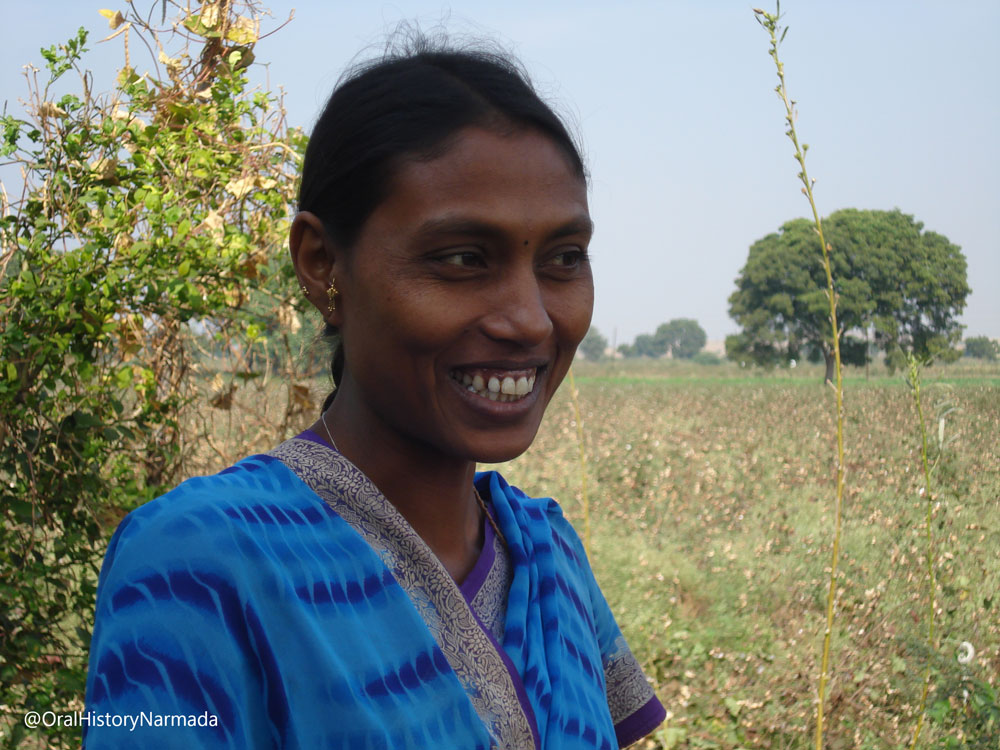
The adivasi villages of Maharashtra falling in the SSP submergence zone have not only been submerged and displaced but also broken up and scattered over several far-flung rehabilitation sites. The stories of their struggle which the women in these villages recount need to be heard first hand to be believed. In this clip, a dynamic young girl from among them, Geeta Vasave, recounts her life story. She tells us how she was just a young girl when she first heard of the dam and how its waters would submerge her village. She would go on to participate in the struggle, and she grows up with it. She would become the first girl from her community to study up to the 12th standard, and she would become the first woman Sarpanch (village head) in the area. She also describes in detail the challenges young adivasis face when they are displaced and excluded from the rehabilitation plans and policies of the state simply because they do not have written birth records or identity documents. Her interview is a ‘must listen’ to understand the personal and collective experiences of adivasi girls and women on the banks of the Narmada and their struggle against their ruthless displacement by the Sardar Sarovar Project.
Interview Duration: 1:08:00
Language: Marathi, Subtitles in English
Bhagvati (Bhabhi) Patidar
Submergence Village Kundia, Madhya Pradesh
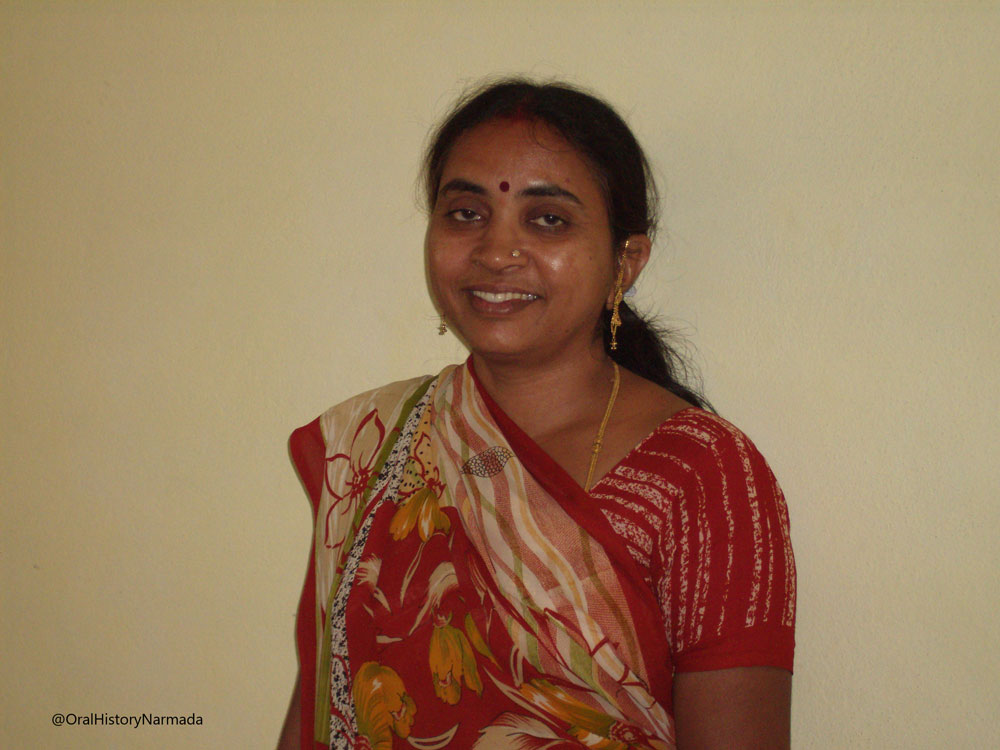
For a woman in Nimad, Madhya Pradesh, where patriarchy is so strong, it was not easy to participate in and extend steadfast support to the Narmada Bachao Andolan (NBA). This was particularly true during the formative years of the NBA. Yet, there was not a single program of the NBA where Bhagvati Patidar, whom we affectionately call bhabhi, would not be present. She led by her quiet but unwavering presence, and instilled great confidence among women – both young and old alike – to become active in the NBA. Her presence on the frontlines of the NBA helped mobilise women and encouraged them to participate in the struggle. Bhabhi’s entire family, both from her parent’s side as well as her in-law’s side have played a phenomenal role in the movement. For a long time, her home in Kundia was like an extension of an NBA office – a home where activists and supporters of the movement were welcomed any time of the day or night, all year around. In her family home, not only did the stream of NBA activists and supporters get a place to stay, but were served sumptuous meals lovingly cooked by Bhabhi and her sisters-in-law. And when the NBA teams travelled to the power centres of the country like Delhi, Bhopal, Mumbai, Bhabhi would cook and carry with her delicious home cooked food for activists that would last for days, while the NBA team campaigned in these faraway places. It was Bhabhi’s warmth that strengthened the camaraderie among people and activists in the movement in the midst of rampant state repression and hostility.
Bhagvati bhabhi’s husband, Maheshbhai’s role in building the NBA and strengthening its presence in the submergence villages of Madhya Pradesh, is unmatched. A great mobiliser and orator, Maheshbhai is extremely popular among the oustees as well as the support groups of the movement. Bhagvati bhabhi’s brother, Mohanbhai Patidar and his family has also played an extremely important role in the NBA. And later on, her daughters too played significant roles in the struggle. Belonging to such maternal and marital families, Bhabhi remains a binding force in the NBA.
Interview Duration: 0:52:46
Language: Hindi, Subtitles in English